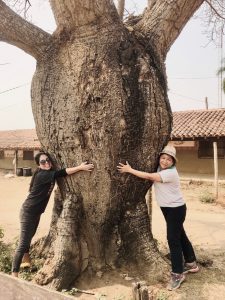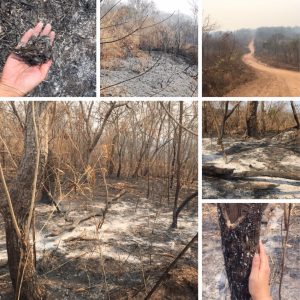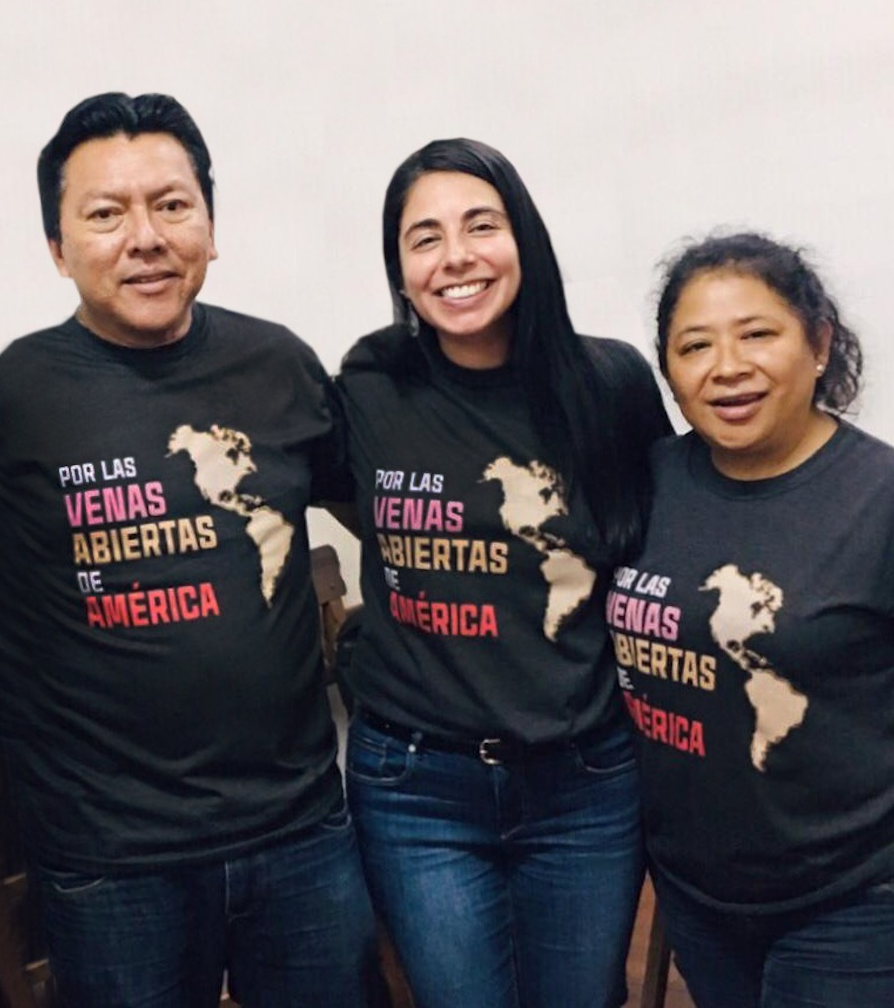 Over the past few weeks, the world’s attention has turned to the burning of the Amazon with a primary focus on Brazil which is home to over 60% of the primordial forest that serves as thermostat and lungs for the planet. However, the burning and loss of forest lands that have occurred in Brazil have also taken place in neighboring countries including Peru, Bolivia, and Ecuador. As the media lens has shifted away from the story the impact of these fires continues to have a devastating effect on not only the environment but to the many indigenous communities that live in areas deeply affected by the fires and destruction.
Over the past few weeks, the world’s attention has turned to the burning of the Amazon with a primary focus on Brazil which is home to over 60% of the primordial forest that serves as thermostat and lungs for the planet. However, the burning and loss of forest lands that have occurred in Brazil have also taken place in neighboring countries including Peru, Bolivia, and Ecuador. As the media lens has shifted away from the story the impact of these fires continues to have a devastating effect on not only the environment but to the many indigenous communities that live in areas deeply affected by the fires and destruction.
In early September I had the opportunity to visit one of those communities that are struggling to recover. Though the narrative and media gaze has turned from those suffering to international power politics those on the ground are still trying to re-grow what was lost both of their lives as well of the trees. This is the story of one community affected and how we can show solidarity in the reconstruction of the Chiquitania forest.
The journey in…
Setting out from Santa Cruz at 4:30 AM we made a great time over the first 100 kilometers of winding yet paved roads. The smooth sailing soon made way to more rudimentary and unpaved roads as dust rose up as the tires trudged through the bumps and ditches. As we got closer the smell of burnt would become ever more pronounced. The smell was felt prior to seeing the burned forest and smoke in the distance. The disaster, the ecocide, the rubble of what had been trees, flora and fauna opened before us; the earth blackened by ashes showed us the traces of the flames.
Halfway to the community we parked the car and walked into the area and to get closer, look at the few remaining trees that withstood the fire. If those few remaining trees could talk, they could speak of eons of existence and the horror of the fires and the heat that still radiated from their ashen bodies. In the middle of the fallen trees and the ashes, there was no life and no animals they the loss of their home too, it was a terrifying moment. The ashes covered the ground, we crouched down to touch the ashes that were once part of the native trees in the area. We walked away thinking that, at any moment due to the heat of that morning, the trunks could be rekindled.
We entered a few more kilometers, the dust rose as we advanced. The road was narrower. The smell of burning was now our guide and it engulfed the fibers of our clothes, skin, and hair. The once blue sky was transformed into a gray post-apocalyptic vision of what destruction can bring.
Arriving in the Chiquitania
In the community we met with Juan Chuviru, an Elder of the village and chief of the San Antonio community Lomerio, which houses 30 communities. Eva Morales, a theologian and psychologist, established contact with Mr. Chuviru through satellite telephone; and he had been awaiting our arrivals in the village to discuss the situation of the population and fires in the area.
The Chiquitanos also referred to as Monkóx, are a native community originally from an area that is now part of the country of Bolivia. The total population numbers just over 50,000 members and are located in the dry forest region near Santa Cruz, Bolivia. The community maintains their original language Bésiro and represent a people that have struggled for self-determination for centuries.
The Monkóx first escaped persecution and submission from the Inca empire followed by surviving the invading Europeans who sought to exploit their labor and destroy their land. Today the once hidden Chiquitanos are now suffering in an extremely visible way as their community and environment seek to rebuild and grow as a result of recent fires. These past few weeks the protection and resources that the forest once provided are now gone due to the raging flames.
In the community there was a palpable sense of pain and anger, to find out who was the culprit, who had purported this crime not only against nature but also the community. The pain was strengthened by the essence that the fires may lead to an end to the way of life the Chiquitania. A community that survived the Incas and the Spanish invasions are now teetering on the edge.
When we met Mr. Chuviru, we hugged him and asked him “how did he feel?” He gazed into the distance as if remembering to a time before the destruction and with a downcast face informed us that he was sad and at the lost. It is a common practice in the area to burn the undergrowth and grasslands and is referred to “Chaqueos,” but this year the fires were out of control, and the community knows that one of its own is the author of this destruction. However, unlike other years he explained the weather an amount of rain has been different than years past and the strong winds led to a lack of any form of control over the raging flames of the fire.
Among the losses were food not only for families but also for livestock, the grass had burned along with the trees, the few cows that the Chiquitanos have in the area are fed. The everyday effort is made to approach the fire zone that was 5 kilometers on foot on the mountain, carrying backpacks with water. However, these efforts have managed to have minimal effect as the fires continued and the well water from natural aquifers have begun to run out.
What could we do? Coming from the city there was the talk of mobilizing volunteers to help, but what were the conditions like? The first thing they told us was, that the volunteers of the city do not serve, you had to walk kilometers through the forest, load the water that was heavy, many of the volunteers did not have the resistance for that road, and their complaints of the heat and strenuous work would hinder more than help.
Harmonious coexistence is fractured
After the destruction, the time for healing and reconstruction is upon us all. The community members we talked with know that when the fire goes out the next job is going to be just as hard and they told us we have to reforest, find water and keep the trees. Perhaps there is a need to dig wells for new waters sources and make canals to ensure that the forest can grow. It is necessary to build lost infrastructure by the fire. In addition to the physical damage, there is also an acute awareness of the trauma as a result of the fires as well as the need to learn from the situation. They said, “we have laws to protect nature, but as a community, they were not meeting them and, we must respect our laws fully so that this disaster does not happen again.”
There was a sadness for the loss, a deep pain for nature. The animals that survived were suffering, the community members were suffering, they did not have enough food and the wise trees had turned to ashes. In the experience of Eva Morales, it is necessary following these incidents to care for the trauma and to make circles of care for everyone in the community to begin the healing process. We listened, we took note, and we agreed that it was time to work together for recovery.
Undoubtedly, the Chiquitanos are a brave community, they were survivors of European colonization, and they are in this moment of pain and loss. The attitude adopted by the community is reminiscent to that shown by indigenous leader Mura, in neighboring country Brazil, “if necessary, I will use the last drop of my blood for this forest.” Showing the world, as well as politicians that a true leader gives life not only for their people but for the world, what really was life in the world without the Amazon?
The natives of the Amazon ask every day to open the skies and the abundant rain of life falls, while the Bolivian government negotiates to see if it will receive foreign aid, the limitations become visible during the tragedy.
Time for healing and reforestation
 We said goodbye to the leaders in our languages, a symbolic act of meeting, we said until soon in Bésiro, Quechua, Aymara and in Spanish, we knew we were relatives and family within this diversity that keeps the continent. We were committing ourselves in our language to build together a true new dawn that includes everyone without distinction, as it always had to be.For the reconstruction and accompaniment steps the Umbrella Initiatives Foundation are joining forces to accompany the Monkóx nation. If you wish to contribute to the healing and reforestation, you can donate here.
We said goodbye to the leaders in our languages, a symbolic act of meeting, we said until soon in Bésiro, Quechua, Aymara and in Spanish, we knew we were relatives and family within this diversity that keeps the continent. We were committing ourselves in our language to build together a true new dawn that includes everyone without distinction, as it always had to be.For the reconstruction and accompaniment steps the Umbrella Initiatives Foundation are joining forces to accompany the Monkóx nation. If you wish to contribute to the healing and reforestation, you can donate here.
